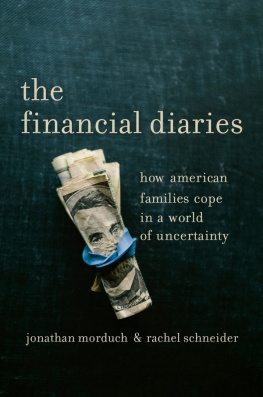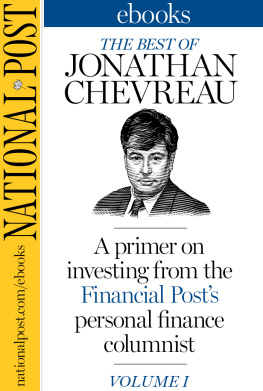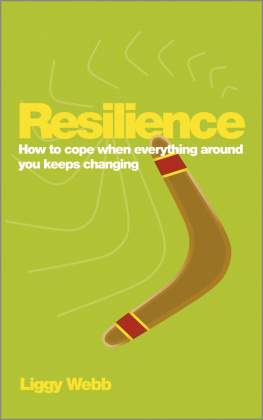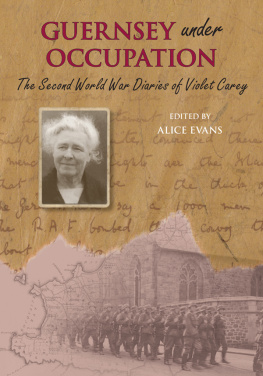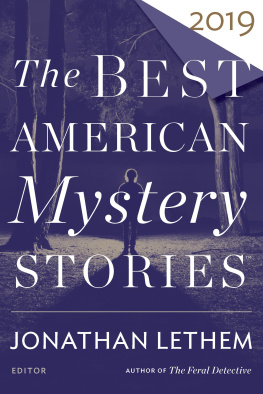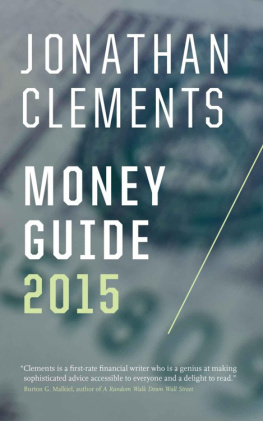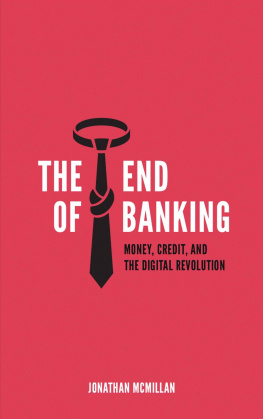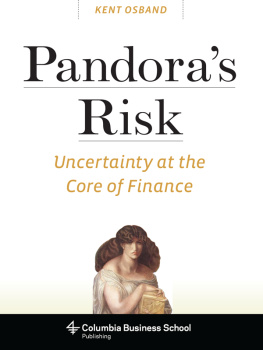Jonathan Morduch - The financial diaries : how American families cope in a world of uncertainty
Here you can read online Jonathan Morduch - The financial diaries : how American families cope in a world of uncertainty full text of the book (entire story) in english for free. Download pdf and epub, get meaning, cover and reviews about this ebook. City: Oxford, Princeton, year: 2019, publisher: Princeton University Press, genre: Home and family. Description of the work, (preface) as well as reviews are available. Best literature library LitArk.com created for fans of good reading and offers a wide selection of genres:
Romance novel
Science fiction
Adventure
Detective
Science
History
Home and family
Prose
Art
Politics
Computer
Non-fiction
Religion
Business
Children
Humor
Choose a favorite category and find really read worthwhile books. Enjoy immersion in the world of imagination, feel the emotions of the characters or learn something new for yourself, make an fascinating discovery.
- Book:The financial diaries : how American families cope in a world of uncertainty
- Author:
- Publisher:Princeton University Press
- Genre:
- Year:2019
- City:Oxford, Princeton
- Rating:4 / 5
- Favourites:Add to favourites
- Your mark:
- 80
- 1
- 2
- 3
- 4
- 5
The financial diaries : how American families cope in a world of uncertainty: summary, description and annotation
We offer to read an annotation, description, summary or preface (depends on what the author of the book "The financial diaries : how American families cope in a world of uncertainty" wrote himself). If you haven't found the necessary information about the book — write in the comments, we will try to find it.
Jonathan Morduch: author's other books
Who wrote The financial diaries : how American families cope in a world of uncertainty? Find out the surname, the name of the author of the book and a list of all author's works by series.
The financial diaries : how American families cope in a world of uncertainty — read online for free the complete book (whole text) full work
Below is the text of the book, divided by pages. System saving the place of the last page read, allows you to conveniently read the book "The financial diaries : how American families cope in a world of uncertainty" online for free, without having to search again every time where you left off. Put a bookmark, and you can go to the page where you finished reading at any time.
Font size:
Interval:
Bookmark:
the financial diaries
The Financial Diaries

How American Families Cope in a World of Uncertainty
Jonathan Morduch & Rachel Schneider
Princeton University Press
Princeton and Oxford
Copyright 2017 by Jonathan Morduch and the Center for Financial Services Innovation
Requests for permission to reproduce material from this work should be sent to Permissions, Princeton University Press
Published by Princeton University Press, 41 William Street, Princeton, New Jersey 08540
In the United Kingdom: Princeton University Press, 6 Oxford Street, Woodstock, Oxfordshire OX20 1TR
press.princeton.edu
Jacket design by Faceout Studio, Charles Brock
Jacket image courtesy of Stocksy United
All Rights Reserved
ISBN 9780-691172989
Library of Congress Control Number: 2016955128
British Library Cataloging-in-Publication Data is available
This book has been composed in Glypha LT Std and Sabon Next LT Pro
Printed on acid-free paper.
Printed in the United States of America
1 3 5 7 9 10 8 6 4 2
For Amy, Leon, Sam, and Joe
For Ben, Isabel, and Ezra
Contents
Acknowledgments
The idea behind the U.S. Financial Diaries project was not initially ours. Instead, we got lucky. The Citi Foundation and Ford Foundation felt it was the right moment to take a fresh look at the finances of American households, and they approached us with the idea. We were honored and not a little daunted. The foundations provided us with an initial planning grant in 2009 and, later joined by the Omidyar Network, saw the project through with a helpful mix of patience and impatience. They pushed us to move quickly given the urgency of families struggles, but they also allowed us the time needed to get the research right. While they offered insights and advice along the way, they imposed no restrictions on our conclusions or analyses. No doubt, they disagreedand may still disagreewith some of what we have written, but they never asked us to do anything other than describe the data accurately and tell the families stories as we heard them. We are deeply grateful to Frank DeGiovanni and Amy Brown at the Ford Foundation; Brandee McHale, Graham MacMillan, and Daria Sheehan at the Citi Foundation; and Chris Bishko and Tilman Ehrbeck at the Omidyar Network.
We are proud and humbled when we think about the families who shared their lives with us. This project required far more of participants than a typical research survey, both in terms of hours and openness. The families willingness to share both their highs and their lows, to answer probing questions not only about what they were doing but about why and how they got there, has shaped all of the ideas in this book.
The U.S. Financial Diaries project benefited greatly from earlier experiences with financial diaries, particularly the work of Stuart Rutherford, Orlanda Ruthven, and Daryl Collins. Daryl and her colleagues at Bankable Frontier Associates were critical to the development of the U.S. Financial Diaries project, working with us to adapt the international methodology to the U.S. context. We greatly value Daryls partnership.
For much of the project, Tim Ogden led the teams operations day to day. He was integral to the development and communication of our findings, not only as a reader and an advisor but also as a roll-up-his-sleeves editor and creator. His contributions can be seen on every page of this book.
The fieldwork was ably led by Nancy Castillo, who threw herself wholeheartedly into the project in its early years. She crossed the country consulting with experts, researched possible sites, developed and executed our initial project plan, and then recruited and managed the team of field researchers. The data analysis was conducted primarily by Anthony Hannagan and Julie Siwicki. Their ability to toggle between fine-grained views of individual households and big-picture technical analyses was essential to telling the families stories, both in the specifics and in the broad picture.
Like the families, the dozen field researchers who collected the data at the center of the project invested far more than the gift of their time. The trust they established with the families during the year of data collection made the project possible. We are grateful to Alex Bibb, Mayra Cerda, Karen Durgans, Luzdary Giraldo, Naishia Jackson, Fredy Llanos, Mithu Maniruzzaman, Olivia Montgomery, Karla Reyes, Joyce Roberson, Kyle Schoolar, and Julie Siwicki.
We were also ably assisted in ways large and small by Alicia Brindisi, Megan Carver, Deidre Ciliento, James Davis, Shannon Deere, Kate Marshall Dole, Cheryl Durgans, Maria Enache, Liz Engle, Stephen Juneau, Charlene Kim, Aishwarya Kumar, Mithu Maniruzzaman, Zac McDermott, Kristen McNeill, Andrea Parra, Spencer Perry, Caroline Preston, James Schintz, Zachary Seaverns, Viral Tarpara, and Caiying (Lisa) Xu. Barbara Kiviat, Jean Lee, Rourke OBrien, and Angela Profeta helped build and revise surveys and protocols to ensure that our questions would connect to broader conversations. Caitlin Weaver, JoAnne Williams, and Vivian Yela expertly managed budgets and administration.
Many people and organizations helped. Local partners in each research site made introductions to families, gave field researchers office space and encouragement, and provided opportunities to share findings. We have not listed these partners individually in order to preserve the anonymity of the research sites, but their dedication and hospitality were essential to the projects success.
We benefited from regular conversation with the community of researchers, policy wonks, and practitioners who are advancing ideas about how to improve household economic security. We are indebted to these fellow travelers. Some of their work is described in the book, but we could have written about many more. We especially thank the U.S. Financial Diaries Advisory Board: Oren Bar-Gill, Michael S. Barr, Ray Boshara, Janis Bowdler, Alan P. Branson, John Caskey, Jose Cisernos, J. Michael Collins, Sheldon Danziger, Randy Dotemoto, Kathryn Edin, Amelia Erwitt, Gina Harman, David John, Jeffrey Liebman, Cathie Mahon, Justin Maxson, Sendhil Mullainathan, Manuel Orozco, Leigh Phillips, William M. Rogers III, David Rothstein, Ellen Seidman, Luz Urrutia, and Sudhir Venkatesh.
The Aspen Institutes Financial Security Program launched a yearlong inquiry into income volatility at just the right time for us. We are especially grateful to the participants in their convenings, who helped us crystalize key arguments that appear in this book, sometimes even while hiking. We also appreciate the chance to try out ideas at the CFED Assets Learning Conference, EMERGE, and Money2020, and at events sponsored by the Federal Reserve, Consumer Financial Protection Bureau, Federal Deposit Insurance Corporation, Roosevelt Institute, University of Wisconsin, Yale, Princeton, the World Bank, and other institutions. At each of these events, we found our ideas prodded and strengthened.
We were fortunate to have readers who commented on all or part of the draft manuscript with gentleness and good humor, and in many cases a sharp red pen: Ray Boshara, Ajay Chaudry, Frank DeGiovanni, Tilman Ehrbeck, Quinten Farmer, Tim Flacke, Joel ben Izzy, Melissa Koide, Susan Lambert, Rob Levy, Signe-Mary McKernan, Ida Rademacher, Caroline Ratcliffe, Luke Shaefer, Daria Sheehan, Michael Sherraden, Viviana Zelizer, and James Ziliak. Ellen Seidman and Jennifer Tescher were especially kind to closely read an early draft of the full book.
Ted Weinstein, our agent, saw the potential for the book and helped us frame the overarching story. We have been wonderfully supported by Princeton University Press, especially Seth Ditchik, Joe Jackson, and Peter Dougherty. Jennifer Backer, Kathleen Cioffi, Tim Harper, Jessica Loudis, Caroline Preston, and Laura Starita helped turn the drafts into a polished book.
Next pageFont size:
Interval:
Bookmark:
Similar books «The financial diaries : how American families cope in a world of uncertainty»
Look at similar books to The financial diaries : how American families cope in a world of uncertainty. We have selected literature similar in name and meaning in the hope of providing readers with more options to find new, interesting, not yet read works.
Discussion, reviews of the book The financial diaries : how American families cope in a world of uncertainty and just readers' own opinions. Leave your comments, write what you think about the work, its meaning or the main characters. Specify what exactly you liked and what you didn't like, and why you think so.

